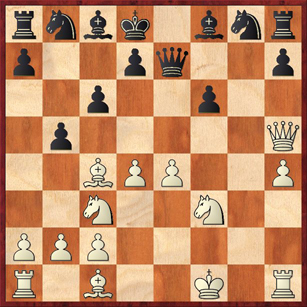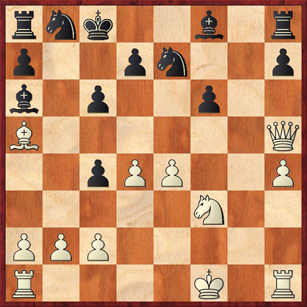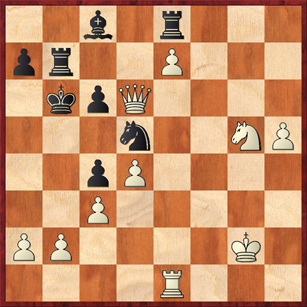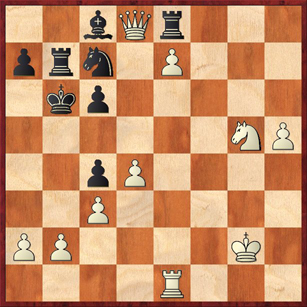That was the story of my game in chess club last night. After winning my first game, I played against Steve Sullivan. As usual, he played poorly in the opening, and I soon had all sorts of delightful winning chances. (See, for example, this post for another example where his questionable opening play led to a nice combination for me.) Our game started as follows:
Dana Mackenzie – Steve Sullivan
1. e4 e5 2. f4 ef 3. Bc4 Qh4+ 4. Kf1 Qe7?! 5. Nc3 c6 6. d4 g5 7. h4 f6? 8. Qh5+ Kd8 9. Nf3 g4 10. Nh2 f3 11. gf gf 12. Nxf3 b5?!
So here we are in a typical Steve Sullivan position. After 12 moves he’s made a lot of pawn moves, lost the castling privilege, and has hardly developed any of his pieces. Here the automatic move would have been 13. Bd3, but I started thinking about ways in which I could exploit the a5-d8 diagonal. After a few minutes, I came up with this neat little trap:
13. Bd2!?
This looks more impressive than it is. If Black has his wits about him, he should realize what White is up to and play 13. … a5. Then White would have to play 14. Bd3, and at best, the move 13. Bd2 has gained him a tempo for development. However, Steve thought for at most 15 seconds, and then walked right into my trap:
13. … bc??
allowing me the beautiful shot,
14. Nd5!
Now Black has to give up his queen to avoid mate.
14. … Ba6 15. Ba5+ Kc8 16. Nxe7+ Nxe7
Now comes the first of two moves that I really regret in this game. White should, of course, play 17. Qe8+ Kb7 18. Qd8, threatening checkmate on c7. I didn’t play this because I thought that after 18. … c3+ 19. Kf2 Bc4 I was giving Black unnecessary counterplay and letting him develop his queenside pieces. What lazy analysis! Let’s just go one more move: 20. bc! and now Black cannot develop his knight to a6 because 21. Rb1+ would lead to mate. And if Black doesn’t play … Na6, I’m bringing my rook to b1 anyway, and the end is near.
Instead I played the prophylactic move 17. c3. In a sense, this isn’t really bad. White still has a huge advantage, and Black is completely bottled up. But it just wasn’t necessary to play prophylaxis here. Black’s “counterplay” was just one check, and there was no need to be afraid of it. When you have a line that obviously wins in just a few moves, and especially when you’re playing game-25, you should go for the line that wins fast. Especially because I had 9 minutes left at this point, and Steve had 19.
Instead we messed around for another 20 moves, and pretty soon we’re on move 39:
First quiz for today. Black has just played 38. … Nd5, undoubtedly thinking that he was going to win White’s e-pawn and finally get some activity for his pieces. But White has prepared a surprise for him. What is it?
Here we get to the “pride goeth before a fall” part of the game. I was so thrilled by my clever combination on move 13 and 14 that I was determined to win the game beautifully. It wasn’t good enough just to win. And it just so happens that I do have a beautiful move here:
39. Qd8+!
In fact, Steve wasn’t expecting this, and he said, “Oh, s***.” But then he recovered his equanimity and played the forced knight retreat.
39. …. Nc7
Second quiz question: Okay, White, you think you’re so clever. What are you going to do with your queen now?
(A) Move it back to d6.
(B) Take something.
(C) Just leave it there.
At this point, I completely lost my cool. I’m down under 2 minutes now. I was still thinking about winning in a blaze of glory, and so I was way too proud to consider answer (A). If only I had enough time to think calmly about the position, I would realize that my Queen is a terrific piece on d8, and there’s absolutely no reason to move it. It restricts all of Black’s pieces, especially the knight on c7, and it is in no danger of being taken. S0 (C) is the right answer. I can just continue 40. h6 Bf5 41. Re5! and Black cannot defend against both threats, h7 and Ne6. If Black plays 41. … R7b8, now White can indeed end with a blaze of glory by playing 42. Qxb8! Rxb8 43. Rxf5. Unlike the game, White still has his two mighty passed pawns, and Black cannot stop them.
But I was past the point of thinking rationally, and still looking for the “brilliant” combination, I chose answer (B):
40. Qxe8??
which was close to being the worst possible move. After 40. … Nxe8 41. h6 Bf5 42. h7 Bxh7 43. Nxh7 Kc7 44. Re2 Kd6 45. Ng5 Rxe7 46. Rxe7 Kxe7, we reached a position where White is now only one pawn up. It is still a completely won game for White, but I’m down to less than 1 minute on the clock, while Steve has at least 5 or 6 minutes. With my psychology completely a mess and my flag hanging, it’s no surprise that I proceeded to make about 20 blunders in a row and lose on time.
What a crazy game chess is! Especially 25-minute chess. Well, I will try to absorb this lesson and let it make me stronger. Don’t let arrogance get in the way of playing good, logical chess.







{ 4 comments… read them below or add one }
I can feel your pain. But I guess even strong players like you are not immune to strategic errors. Someone once told me that when this happens in your game it means that the violated principle corresponding to the error, which in this case for the stronger side to avoid simplification by trades, is not well etched in the subsconcious especially when the move is made during a time scramble.
I guess the point is true that time scrambles reveal which chess knowledge has not yet been firmly etched in our minds. I am sure you would have found …Nc7, adding pieces to the attack if you had time to think of your moves.
A good move is usually the product of our careful thought. But the same good move by very strong players simply come naturally.
Does the above make sense?
I think you’re exactly right about time scramble situations. In time scrambles I tend to “revert” to weaker thought patterns. I’ve noticed that I make two typical kinds of time trouble mistakes: 1) playing too recklessly, trying to “force the action” and forgetting about the weaknesses I’m creating; or 2) playing too conservatively, playing “safe” defensive moves instead of pressing for the initiative. I know these two kinds of mistakes sound contradictory, but in both cases I’m losing control over my conscious thought processes and reverting to subconscious or emotional styles of thinking.
There’s another piece of irrational psychology here. When I look at this position, with the queen next to the rook, it gives me a very uncomfortable feeling. There’s a tension here that (psychologically) needs to be resolved. It somehow just doesn’t feel “natural” for a rook and a queen to sit next to each other, eyeball to eyeball, for several moves. Someone’s got to blink — either the rook has got to take the queen, or vice versa.
This “rule” is of course completely bogus; it’s a subconscious thought pattern, and it takes a conscious effort to resist that thought pattern. In a time scramble, I couldn’t muster that degree of awareness. I reverted to “take-or-be-taken” mode, and so I played 40. Qxe8??
I also think there was something interesting (psychologically) about the fact that I missed Black’s 39. … Nc7. It goes back to what I wrote about in a previous post, “Admitting mistakes.” Black had just played his knight from c7 to d5, and so when I played 39. Qd8+ I was not mentally prepared for him to admit his mistake and go from d5 back to c7. Again, he had enough time to get over his emotional reaction and think about the position logically. I didn’t.
I wish I had a videotape of our reactions when we played these two moves!
I have to clarify that trading when ahead is also a valid principle. I forgot to add that it is the position that determines which principle is at play. In your game, keeping the material (Queen) on board when you have an overwhelming attack is clearly the principle at play.
I think you are saying something profound with regards to chess psychology and differentiating between the conscious and the subconcious as pathways. I think I am confusing the two. In my mind, we train and learn chess via the “concious” until it becomes part of the sub-concious. It is like driving a car. We think it is a concious effort but it is not. In fact, we drive almost by memory which explains why we do not notice things on the street. Our minds selectively pays attention to things like trafffic signals and from obvious harm like an oncoming traffic.
This explains also our tendency to move the car any time we see a green light because the color green from memory means move even though it is a protective green for the folks turning left or turning right.
Should concious chess moves become so etched in memory that when the right environment appears the move becomes a subconcious reaction? Is this why grandmasters are drawn to unprotected squares for a knight outpost without much effort?
Amateur minds have to try harder it seems to see knight retreat moves towards an outpost than masters. What is natural for the master is arrived at by concious thought and some clock time by the amateur. The same is true with how we consider viable moves. The master quickly sees which ones are good candicates while the amateur struggles and though may eventually narrow the choices to something similar but only after wasting considerable clock time.
I guess it becomes a function of economy of effort which brings us to the often heard observation that the master made it look effortless. This notion reminds me of how Capablanca, Karpov and Kramnik play chess.
I would like to see more of your thoughts and what others think about this aspect of chess.
Both Dana’s and Andy’s comments on the psychology of the game much sense. However, if time trouble triggered the psychological factors that caused the blunders, then it may be worthwhile for Dana to ask himself ¿How did I get into time trouble in the first place? ¿Can I identify one or more moves over which I “wasted” time? The other day I was listening in Chess FM to an interview of Andy Soltys by John Watson where Soltys said that Fischer thought it was a waste of time to look for the very best move in a position, that simply finding and playing strong – not necessarily the best – moves consistently, all of the time, was enough to win, or anyway not lose, a game.